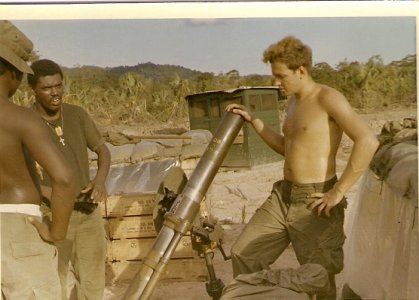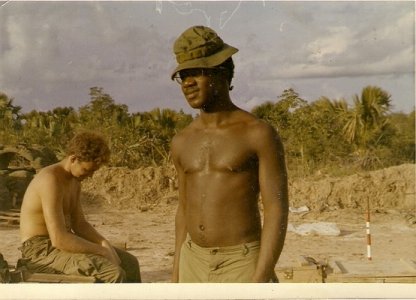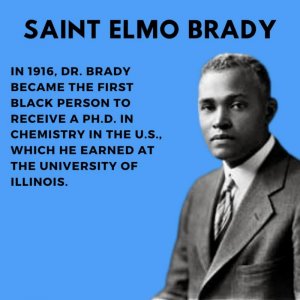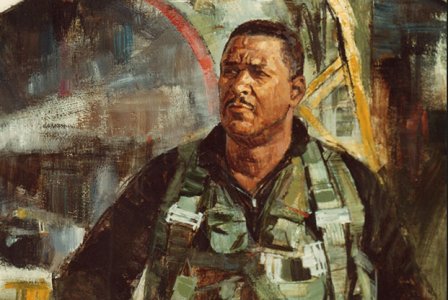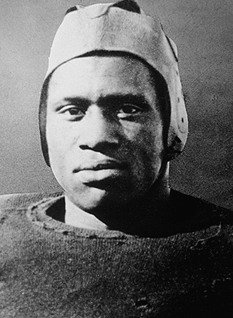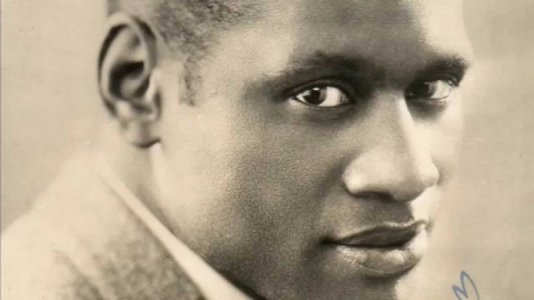OneEyedDiva
SF VIP
- Location
- New Jersey
This year's Black History Money is significant to me for more than just continuing to learn about our history, but an exhibit at our city hall will include a tribute to my late husband, who was one of the first Black business owners in town. He helped many young men who wanted to open businesses to get started. Shortly after he died, a small business scholarship was established in his name to honor him. My husband was also a well known activist and well respected within the community. More on that later.
This following post that a historian friend posted on Facebook really speaks to me because I remember my grand uncle telling us when he got back from the war, from defending this country...he went into a diner just to get a cup of coffee and the owner refused to serve him because he was Black!
"DISCRIMINATION AND BLACK VETERANS
Veterans Day is an occasion to acknowledge with respect and appreciation those who have served in the United States Armed Forces. But for generations, African Americans returning home from service were more likely to face discrimination, disrespect, violence, and even death.
During the late 19th and early 20th centuries, white supremacy remained law and custom throughout the nation, and many whites feared that black soldiers who had experienced the pride of military service would resist the disenfranchisement, segregation, and second-class citizenship that still characterized the African American experience. In August 1917, U.S. Senator James Vardaman of Mississippi, (an unapologetic racist) warned that, once a black soldier was allowed to see himself as an American hero, it would be “but a short step to the conclusion that his political rights must be respected.” Bringing black soldiers home to the South with expectations of equality, he predicted, would “inevitably lead to disaster.”
For Senator Vardaman, black soldiers’ potential as community leaders was terrifying, and the “disaster” would be a mass movement for African American rights. Indeed, many African American soldiers returned determined to fight for their own freedom and equality, and veterans like Hosea Williams and Medgar Evers played central roles in what became the civil rights movement. The effort to suppress that potential leadership made black veterans targets, and many suffered brutal violence for protesting mistreatment or simply wearing their military uniforms. In August 1898, a black Army private named James Neely was shot to death by a mob of white men in Hampton, Georgia, for protesting a white storekeeper’s refusal to serve him at the soda counter.
In Hickman, Kentucky, a recently-discharged black soldier named Charles Lewis was lynched in uniform in December 1918, just weeks after the end of World War I. Mr. Lewis was standing on the street in his uniform when a white police officer began harassing him and claimed he fit the description of a robbery suspect. When Mr. Lewis insisted that he was a soldier with no reason to rob anyone, the officer accused him of assault and arrested him. The next morning, a mob of white men broke into the jail, seized Mr. Lewis, and hanged him.
Black veterans of World War II also faced violence for the most basic assertions of equality and freedom. In August 1944, the white owner of a small restaurant in Shreveport, Louisiana, shot and wounded four black soldiers he claimed “attempted to take over his place.” He faced no charges.
In June 1947, a black Navy veteran named Joe Nathan Roberts, studying at Temple University through the G.I. Bill, was visiting family in Sardis, Georgia, when a group of white men became upset because he refused to call them “sir.” Later that night, the men abducted Mr. Roberts from his parents’ home and shot him to death.
The next year, on September 9, 1948, a group of white men shot and killed a 28-year-old black veteran named Isaiah Nixon outside of his home and in front of his wife and six children, just hours after he defied threats and voted in the local primary election in Montgomery County, Georgia. Two white men arrested and charged with his death were later acquitted by all-white juries.
These and countless more black veterans served bravely in defense of America only to face terrible mistreatment, violence, and lynching when they returned. In November 1942, while stationed at Camp Polk, Louisiana, Private Merle Monroe wrote a letter to the Pittsburgh Courier describing the black soldier’s struggle to maintain a sense of patriotic pride in the face of lynching. “Paradoxically enough,” he wrote, “our country spends millions annually in effort to build up ***** morale, both in and out of the army, yet, foolishly, destroys the blue print of its program by tolerating brutal killings without even a pretense of a fair trial.”
Excerpt Source
https://eji.org/reports/targeting-black-veterans/"
@Pecos @Pinky @Alligatorob @Nathan
This following post that a historian friend posted on Facebook really speaks to me because I remember my grand uncle telling us when he got back from the war, from defending this country...he went into a diner just to get a cup of coffee and the owner refused to serve him because he was Black!
"DISCRIMINATION AND BLACK VETERANS
Veterans Day is an occasion to acknowledge with respect and appreciation those who have served in the United States Armed Forces. But for generations, African Americans returning home from service were more likely to face discrimination, disrespect, violence, and even death.
During the late 19th and early 20th centuries, white supremacy remained law and custom throughout the nation, and many whites feared that black soldiers who had experienced the pride of military service would resist the disenfranchisement, segregation, and second-class citizenship that still characterized the African American experience. In August 1917, U.S. Senator James Vardaman of Mississippi, (an unapologetic racist) warned that, once a black soldier was allowed to see himself as an American hero, it would be “but a short step to the conclusion that his political rights must be respected.” Bringing black soldiers home to the South with expectations of equality, he predicted, would “inevitably lead to disaster.”
For Senator Vardaman, black soldiers’ potential as community leaders was terrifying, and the “disaster” would be a mass movement for African American rights. Indeed, many African American soldiers returned determined to fight for their own freedom and equality, and veterans like Hosea Williams and Medgar Evers played central roles in what became the civil rights movement. The effort to suppress that potential leadership made black veterans targets, and many suffered brutal violence for protesting mistreatment or simply wearing their military uniforms. In August 1898, a black Army private named James Neely was shot to death by a mob of white men in Hampton, Georgia, for protesting a white storekeeper’s refusal to serve him at the soda counter.
In Hickman, Kentucky, a recently-discharged black soldier named Charles Lewis was lynched in uniform in December 1918, just weeks after the end of World War I. Mr. Lewis was standing on the street in his uniform when a white police officer began harassing him and claimed he fit the description of a robbery suspect. When Mr. Lewis insisted that he was a soldier with no reason to rob anyone, the officer accused him of assault and arrested him. The next morning, a mob of white men broke into the jail, seized Mr. Lewis, and hanged him.
Black veterans of World War II also faced violence for the most basic assertions of equality and freedom. In August 1944, the white owner of a small restaurant in Shreveport, Louisiana, shot and wounded four black soldiers he claimed “attempted to take over his place.” He faced no charges.
In June 1947, a black Navy veteran named Joe Nathan Roberts, studying at Temple University through the G.I. Bill, was visiting family in Sardis, Georgia, when a group of white men became upset because he refused to call them “sir.” Later that night, the men abducted Mr. Roberts from his parents’ home and shot him to death.
The next year, on September 9, 1948, a group of white men shot and killed a 28-year-old black veteran named Isaiah Nixon outside of his home and in front of his wife and six children, just hours after he defied threats and voted in the local primary election in Montgomery County, Georgia. Two white men arrested and charged with his death were later acquitted by all-white juries.
These and countless more black veterans served bravely in defense of America only to face terrible mistreatment, violence, and lynching when they returned. In November 1942, while stationed at Camp Polk, Louisiana, Private Merle Monroe wrote a letter to the Pittsburgh Courier describing the black soldier’s struggle to maintain a sense of patriotic pride in the face of lynching. “Paradoxically enough,” he wrote, “our country spends millions annually in effort to build up ***** morale, both in and out of the army, yet, foolishly, destroys the blue print of its program by tolerating brutal killings without even a pretense of a fair trial.”
Excerpt Source
https://eji.org/reports/targeting-black-veterans/"
@Pecos @Pinky @Alligatorob @Nathan


